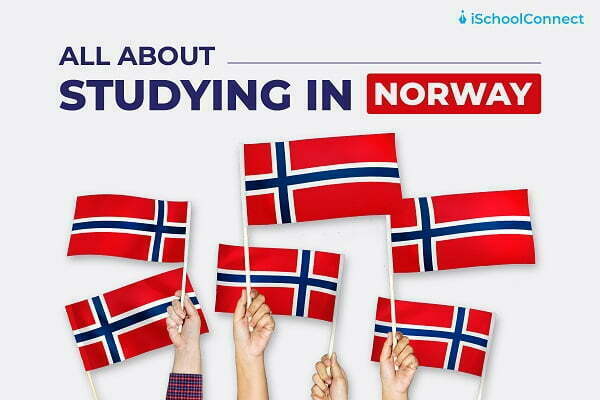Table of Contents
This may be a change from the countries you and your friends would have considered studying in. However, Norway has been ranked as ‘the best country to live in’ by the United Nations Human Development Report. Not only are the quality of education, the universities, and the cost of study in Norway good, but the activities on and off campus represent an important social context for students.
Read More: Norway Scholarship | 5 best scholarships for you to know!
Feeling curious? This is your one-stop shop to know all about how to study in Norway! Right from the benefits of studying in Norway, best Norway universities, how to apply, and more. Let’s begin!
Why study in Norway?

Norway is a Scandinavian country ranked as one of the best in the world to live in and has one of the lowest crime rates in the world.
There are many reasons you should study in Norway, including-
1. Active student life
Student life in Norway is rich, active, and social. Alongside your studies, you can also take part-time jobs in Norway to gain work experience and supplement your student loan.
You can also be involved in student associations, like student sports teams and student councils, and society. As an international student, this type of engagement is essential to integrate with Norwegian students.
Read More: Job opportunities in Norway | 7 high-in-demand jobs for you
The atmosphere on campus is more informal and teachers are easily approachable. They encourage you to develop your critical thinking for a better future.
2. International music festivals
Music festivals are a natural part of Norwegian culture. You can attend different music festivals, starting from the Bergen International Festival in spring to the Üya festival in August. They attract renowned performers from across the world!
3. Rich culture
Norway has an incredibly accomplished culture and varied arts scene. You can visit monuments like the Astrup Fearnley Museum and the Oslo Opera House not just to witness the level of performances and exhibitions there but also their magnificent architecture.
4. Outdoor life and nature
Norwegian people like to spend much of their time outdoors. You can hike the mountains, go skiing, and take part in many outdoor sports and activities as a part of your course.
How can we talk about ‘how to study in Norway’ and not mention the Northern lights! It is also known as aurora borealis and shows up at night when the sky is dark. Whichever of the cities in Norway you study in, nature won’t be far away!

How is the Norwegian education system?
Norway’s universities deliver quality education. In fact, according to StudyPortals International Student Satisfaction Awards 2014, it’s a highly appreciated study destination in Europe. It is a priority for the authorities of Norway to develop and maintain a high-quality education system, open to all students, regardless of their background.
The country also has numerous private higher education institutions which receive public funding. They teach many courses and degree programs in English in most cities in Norway. High use of English in Norwegian society makes it convenient for students to both live and study in Norway.
Generally, the academic year in Norway runs from August to June. To get admission in most study programs and all master’s programs in Norway, you need to directly apply to the university.
How is the quality of education?

As Norway universities are few and small as compared to universities in other countries around the world, the country can keep high standards in delivering quality education.
The high quality of Norway universities and colleges has resulted in more and more international students opting to study in Norway. The students here are expected to be responsible for their own learning, and extracurricular activities can be pivotal for the successful integration of international students.
The educational system is mostly state-supported to ensure equal access to education for all.
Best universities in Norway
There are some high-ranked universities in Norway and great student accommodation options. The classes in Norway’s universities are organized in compact groups to improve learning and cooperation among students.
Language barriers aren’t a major concern, as most Norwegians are fluent in English. It is easy to adapt, as it’s based on fair and equal opportunities.
Here are the top 8 universities in Norway that attract all international students-
- University of Stavanger
- University of Oslo
- The University of Bergen
- UiT The Arctic University of Norway
- Norwegian University of Life Sciences (NMBU)
- Norwegian University of Science and Technology (NTNU)
- BI Norwegian Business School
- Ostfold University College
Cost to study in Norway for international students
Costs of studying
Pursuing higher education in foreign countries is expensive and tuition fees make up the bulk portion of the total international study cost. However, this is not the case when you study in Norway because the public universities offer free education to both Norwegian and international students.
Most Norway public universities do not charge any tuition fees for undergraduate courses, master’s programs as well as PhDs for students from any country. You only would have to pay a student union fee that is between 30 to 60 EUR per semester.
However, if you are taking education from one of the top private universities, you may be charged tuition fees between 9,000 to 19,000 EUR annually for your master’s program.
Living costs
Living expenses in the cities in Norway are high. It is more common for students to rent their house. For student housing or renting, you need to pay anywhere between 300 to 700 EUR per month.
You will spend around 250 to 400 EUR per month on food. You can save up by cooking from scratch as groceries stores sometimes offer discounts. Norway has good public transport making it convenient. A monthly transport pass can cost anywhere between 55 and 72 EUR.
Generally, the living cost to study in Norway may fall between 800 to 1,400 EUR per month. Expenses can be higher in large cities. You need a residence permit to work in Norway after your graduation. But before getting a residence permit, you must have a job in hand.
Scholarships and part-time job opportunities

Norway offers various scholarships for international students, including-
- Semester grants
- The Erasmus+ grant
- Nordplus student grant
- Quota Scheme
- The Norwegian State Educational Loan Fund
Note that such funding opportunities are few and would not cover all the costs of your education in Norway. International students can do part-time work but don’t rely on that option as its scope is limited.
A statement from the institution should accompany the application for a work permit. This must confirm that the work will not affect your studies. You will need to submit this along with a letter from the employer stating the student has a job offer.
Norway admission requirements
To apply for undergraduate programs the admission must be sent to the Norwegian Universities and Colleges Admission Service (NUCAS). Some private institutions will have separate admissions processes where you can send the application directly to the institution.
For your Master’s and Ph.D. programs, applications for admission must go directly to the institution you want to study. Since you submit applications to individual schools, the requirements will vary.
However, this is generally what you would need to apply to a university in Norway
- A copy of your passport
- Transcripts
- Two letters of recommendations
- CV
- Proof of English proficiency (IELTS or TOEFL)
It’s best to prepare your documents at least 6 months in advance as this process will take time. Once you receive the letter of acceptance, you can start applying for a student visa.
Norway student visa & permits
Since Norway is a part of the EEA nations of the EEA, the EU, and Switzerland can move freely to Norway. Those from elsewhere need a visa to study in Norway.
Get a student visa for Norway you will need-
- A valid passport
- A completed application form
- Two recent passport size photos
- Proof of your acceptance letter
- Financial proof of your funding
- Proof of accommodation
- Proof that you will leave Norway once your resident permit expires.
Since the process may take two months or so, it’s best to apply for the visa at your earliest.
Should I study in Norway?
There are many factors that make studying in Norway an attractive option among international students.
Norway universities can offer high-quality programs and courses to you whether you’re looking for higher education after your graduation or looking to specialize within a subject area.
Besides regular programs such as social sciences, computer science, logistics, natural sciences, engineering design, and humanities, institutions even have their own unique programs to offer!
And let’s not forget, experiencing the information, beautiful nature, and culture of Norway is a plus.
If you find a university that offers you the course of your dreams, you should study in Norway!
In case you’re confused and need more information, don’t hesitate to reach out to us or comment below!
Read more: Best countries to study abroad and work







Between Canada and Norway which is better in times of studying work cost of living, expenses and income
Hey,
One of our counselors will get in touch with you soon!
All the best.
You can also contact us-
Email- info@ischoolconnect.com
Phone +91 9145332283